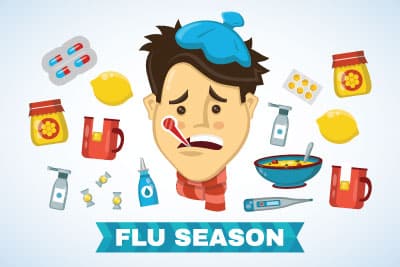Flu Safety in the Workplace: Your Ultimate Guide to Preventing Influenza

Introduction
Flu season is a challenging time, especially in the workplace. With the flu virus becoming more active during colder months, it's crucial to take steps to prevent the spread of flu in the workplace. In this comprehensive guide, we'll cover everything from flu prevention tips to the importance of flu vaccination.
Meet the Expert: RN Aitor Aspiazu
Aitor Aspiazu is a Registered Nurse with over 20 years of experience in healthcare, specialising in immunisation and corporate health. "The flu isn't just a bad cold; it can seriously affect your health and productivity. That's why taking preventative measures is crucial," says Aitor.
How Does Flu and Cold Spread in the Workplace?
Flu is most contagious during the first 3 to 7 days after symptoms start. Employees coming to work while sick will likely spread the virus through respiratory droplets when they sneeze or cough. "It's like tossing a snag on the barbie without cooking it properly; you're just asking for trouble," Aitor often says to his clients.
Preventing the Spread of Flu
Good hygiene practices, such as frequent handwashing, can help prevent the spread of the flu virus. Aitor advises, "Think of hand hygiene like putting on sunscreen before hitting the beach; it's a simple step that can save you a lot of discomfort later."
Stay Home Policies
Encourage employees to stay home if they are sick to reduce the spread of the flu. It's essential to have sick leave policies that allow workers to stay home to recover from this nasty illness.
Occupational Safety Measures
In healthcare settings or other occupational environments with a high risk of flu exposure, implementing sound hygiene practices and getting an annual flu vaccine is crucial.
The Importance of Flu Vaccination in the Workplace
Flu vaccination is the most effective way to prevent seasonal flu. "Getting your flu shot is like having a good wicketkeeper in a cricket match; it catches most of what comes its way," Aitor explains.
Who Should Get Vaccinated?
It is highly recommended that individuals who have a high risk of developing complications from the flu should also receive an annual influenza vaccine. These include the following:
- Those aged 65 and above
- Individuals aged over six months who could develop severe symptoms and infection from existing medical conditions are at higher risk. These conditions include nervous system disorders, kidney conditions, lung illness, heart problems, asthma, chronic illnesses, diabetes, and auto-immune conditions. Additionally, people who are constantly exposed to infected patients are also at a heightened risk.
Corporate Flu Vaccination Programs
Providing corporate flu vaccinations is a proactive way to promote flu safety in the workplace. These programs can significantly reduce flu complications and improve overall occupational safety and health.
When to Get Vaccinated?
It's advisable to get vaccinated during autumn to allow your immune system to generate antibodies before the onset of flu season. If you have any questions about the flu, you can always contact Aitor via LinkedIn.
Preventing colds and flu in the workplace is a collective effort that involves good hygiene, staying home when sick, and getting a flu vaccine. For more information or to schedule your annual flu vaccination, call us at 1300 79 74 10 or book your nationwide program online.
How to stop cold and flu viruses from spreading in the workplace
- Behind the Syringe
- Flu Insights

Introducing Aitor Aspiazu, your go-to flu expert and a Registered Nurse accredited by AHPRA (NMW0001159845). Boasting over two decades of experience in healthcare, Aitor has navigated everything from Emergency Departments to Corporate Wellness Programs—and yes, he’s even battled the flu himself. As the Founder and Lead Nurse Consultant at Corporate Care, he’s the driving force behind workplace health and well-being. No longer in scrubs, he’s now at the forefront of healthcare innovation, leveraging Artificial Intelligence and automation to revolutionise workplace health and well-being. As the Founder and Lead Nurse Consultant at Corporate Care, he’s the visionary behind cutting-edge flu vaccination programs that keep businesses running smoothly. Off-duty, he’s a proud dad and a Padel addict who represented Australia in the World Padel Championship. Trust Aitor; he’s got your back when it comes to flu prevention and modern healthcare solutions.
